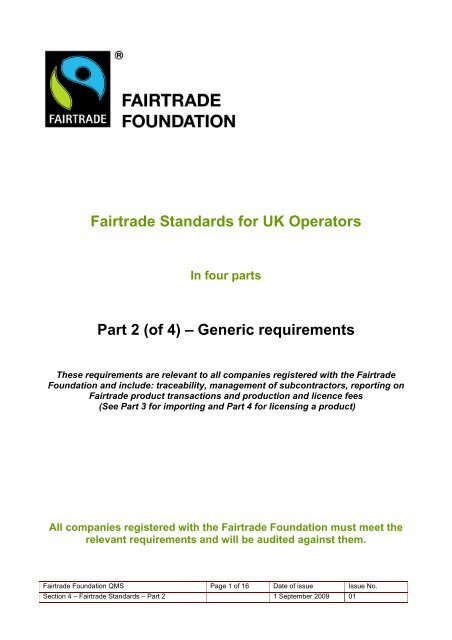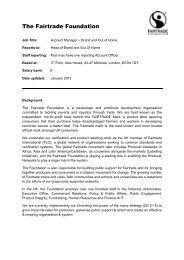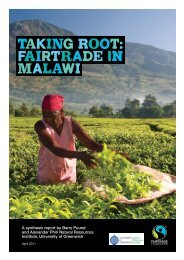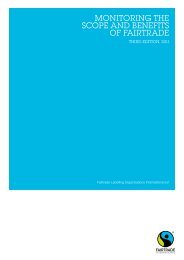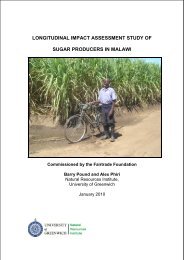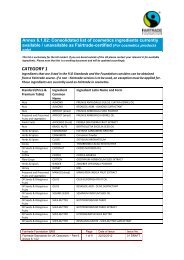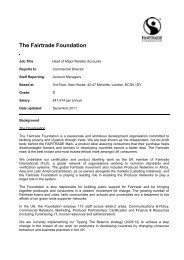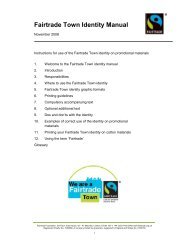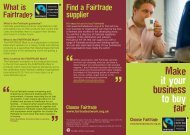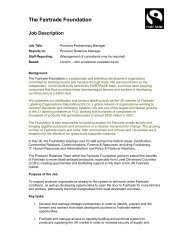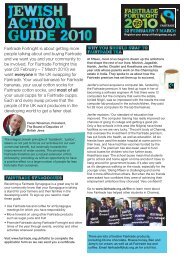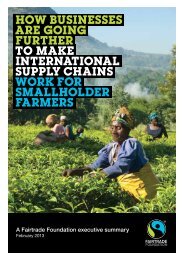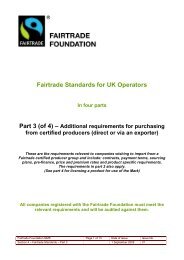Fairtrade Standards for UK Operators In four parts Part 2
Fairtrade Standards for UK Operators In four parts Part 2
Fairtrade Standards for UK Operators In four parts Part 2
You also want an ePaper? Increase the reach of your titles
YUMPU automatically turns print PDFs into web optimized ePapers that Google loves.
<strong>Fairtrade</strong> <strong>Standards</strong> <strong>for</strong> <strong>UK</strong> <strong>Operators</strong><br />
<strong>In</strong> <strong>four</strong> <strong>parts</strong><br />
<strong>Part</strong> 2 (of 4) – Generic requirements<br />
These requirements are relevant to all companies registered with the <strong>Fairtrade</strong><br />
Foundation and include: traceability, management of subcontractors, reporting on<br />
<strong>Fairtrade</strong> product transactions and production and licence fees<br />
(See <strong>Part</strong> 3 <strong>for</strong> importing and <strong>Part</strong> 4 <strong>for</strong> licensing a product)<br />
All companies registered with the <strong>Fairtrade</strong> Foundation must meet the<br />
relevant requirements and will be audited against them.<br />
<strong>Fairtrade</strong> Foundation QMS Page 1 of 16 Date of issue Issue No.<br />
Section 4 – <strong>Fairtrade</strong> <strong>Standards</strong> – <strong>Part</strong> 2 1 September 2009 01
Contents<br />
Section<br />
2.1 Registration & certification<br />
Requirements<br />
Who should read this?<br />
All 3<br />
2.2 Control of subcontractors <strong>Operators</strong> using<br />
subcontractors<br />
2.3 Traceability & documentation All<br />
2.4 Flow of Goods reporting<br />
2.5 Registration & licensing fees<br />
Annexes<br />
Section<br />
Annex 2.1 Registration bodies<br />
2.1.01 Table of registration/certification bodies<br />
2.2 Procedures<br />
2.2.01 Non-compliance, corrective actions and<br />
penalties<br />
2.2.02 Appeals procedure summary<br />
2.2.03 Suspension & termination procedure<br />
summary<br />
2.3 Category specific requirements<br />
2.3.01 Trading <strong>Part</strong>nership Plan<br />
2.3.02 Trading <strong>Part</strong>nership Plan – guidance<br />
2.3.03 <strong>Fairtrade</strong> fruits and small farmer<br />
preference<br />
All 13<br />
All 14<br />
Page<br />
Who should read this? Link<br />
All Click here<br />
All Click here<br />
All Click here<br />
All Click here<br />
All cosmetics licensees Click here<br />
All cosmetics licensees Click here<br />
All trading in fresh fruit Click here<br />
2.3.04 <strong>Fairtrade</strong> Standard <strong>for</strong> Seed Cotton All trading in cotton/cotton<br />
products<br />
2.4 List of current versions <strong>for</strong> each Annex<br />
Please note the Annexes will be updated regularly – if you have printed this off please check the website <strong>for</strong><br />
the latest version.<br />
7<br />
9<br />
Click here<br />
2.4 List of current versions of Annexes All Click here<br />
<strong>Fairtrade</strong> Foundation QMS Page 2 of 16 Date of issue Issue No.<br />
Section 4 – <strong>Fairtrade</strong> <strong>Standards</strong> – <strong>Part</strong> 2 1 September 2009 01
2.1 Registration & certification requirements<br />
THIS SECTION APPLIES TO ALL REGISTERED OPERATORS<br />
Foundation policy: The Foundation specifies the conditions <strong>for</strong> granting, maintaining and extending<br />
the registration of <strong>Operators</strong> to trade in <strong>Fairtrade</strong> certified products, the licensing of <strong>Operators</strong> to use<br />
the Mark and the conditions under which these may be suspended or withdrawn, partially or in total.<br />
2.1.01 (FLO 1.1) All <strong>Operators</strong> who take title to a <strong>Fairtrade</strong> ingredient or product, i.e. it is purchased and<br />
resold, and the subcontractors who manufacture, process, re-label or store the products on their<br />
behalf will be subject to a certification regime to assess compliance to these standards.<br />
2.1.02 The types of operation subject to the above requirement and the certification/registration bodies are<br />
set out in the table in Annex 2.1.01<br />
Guidance: FLO-CERT operates internationally and the Foundation operates in the <strong>UK</strong>. However<br />
there are some situations where a <strong>UK</strong> Operator must be registered with FLO-CERT or the overseas<br />
subcontractors of a <strong>UK</strong> Operator must be registered with the Foundation. Other national labelling<br />
initiatives carry out their own registration/certification. See Annex 2.1.01 <strong>for</strong> more details.<br />
Conditions <strong>for</strong> issuing and maintaining the registration<br />
2.1.03 (ST&C 5.1) The Operator shall implement and comply with the relevant sections of these standards<br />
and the up-to-date version shall be available to key personnel. Existing <strong>Operators</strong> shall implement<br />
these standards and future amendments to the standards not less than three months from the date<br />
of notification, unless a later date is specified within the standard. New applicants shall implement<br />
these standards from the date they apply to the Foundation.<br />
2.1.04 Importers shall implement and comply with the relevant <strong>Part</strong> C – Product Trade <strong>Standards</strong> as they<br />
apply to the <strong>Fairtrade</strong> certified products imported. These are detailed in <strong>Part</strong> 3 of these standards.<br />
2.1.05 (ST&C Article 5.2) <strong>In</strong> the situation where the Operator is selling unfinished products to a company<br />
registered with FLO-CERT, the Operator shall also be registered with FLO-CERT <strong>for</strong> these <strong>Fairtrade</strong><br />
products and shall require its suppliers to do so (see 2.1.02 above).<br />
2.1.06 (FLO GTS 1.3) All <strong>Operators</strong> must designate one official contact to represent the company in its<br />
certification dealings with the Foundation.<br />
FLO guidance: All <strong>Operators</strong> must designate one key contact person (a <strong>Fairtrade</strong> Officer) within their<br />
organisation. The <strong>Fairtrade</strong> Officer will be the main contact person <strong>for</strong> certification and audit issues.<br />
She or he will be responsible <strong>for</strong> ensuring the Operator’s compliance with all certification<br />
requirements and <strong>for</strong> keeping the certifier updated with contact details and other relevant<br />
in<strong>for</strong>mation.<br />
2.1.07 (ST&C 6.3) An Operator wishing to use the Mark on finished products shall make a <strong>for</strong>mal<br />
application to the Foundation <strong>for</strong> each individual product, using the relevant <strong>for</strong>m. See <strong>Part</strong> 4 of<br />
these standards.<br />
2.1.08 (ST&C 5.6.1) The Operator shall enter into the Registration, Licensing and Certification Agreement<br />
with the Foundation, agreeing to abide by the conditions <strong>for</strong> certification and comply with the<br />
Foundation’s standards.<br />
Guidance: The operator must in<strong>for</strong>m the <strong>Fairtrade</strong> Foundation of any changes to their company<br />
name or address so that the agreement can be updated.<br />
2.1.09 The Operator shall make claims of <strong>Fairtrade</strong> certified status or use the FAIRTRADE Mark only in<br />
respect of products which the Foundation has certified and which appear in the Schedules to the<br />
Registration, Licensing and Certification Agreement.<br />
Guidance: <strong>Operators</strong> will also be required to register all their activities in relation to the <strong>Fairtrade</strong><br />
products (e.g. importing, processing and manufacturing) once the Foundation has established an<br />
online recording system. These activities will be included in the schedules to the Operator’s<br />
agreement.<br />
<strong>Fairtrade</strong> Foundation QMS Page 3 of 16 Date of issue Issue No.<br />
Section 4 – <strong>Fairtrade</strong> <strong>Standards</strong> – <strong>Part</strong> 2 1 September 2009 01
2.1.10 The Operator shall notify the Foundation of any changes to the product supply chain and/or product<br />
specifications prior to these being implemented.<br />
2.1.11 The Operator shall notify the Foundation of any significant changes to the company’s processing<br />
facilities, such as moving the processing to another site or use of a subcontractor.<br />
2.1.12 The Operator shall provide site access during normal working hours, announced or unannounced, to<br />
an assessor authorised to audit the registered operations.<br />
2.1.13 The Operator shall make available to the auditor the signed Registration, Licensing and Certification<br />
Agreement and the Schedules, relevant stock and financial records, including purchase and sales<br />
invoices, disposals as non-<strong>Fairtrade</strong> or samples, wastage, recipe sheets, processing records,<br />
product labels and evidence of artwork approval <strong>for</strong> the use of the Mark <strong>for</strong> the purposes of the audit.<br />
2.1.14 (ST&C 8.1) The Operator shall pay all fees and costs related to the scheme according to the terms<br />
and conditions of the Foundation’s Registration, Licensing and Certification Agreement.<br />
2.1.15 The Operator shall correct any identified non-compliance within the periods specified and provide<br />
timely response to any/all correspondence issued by the Foundation, in realisation that failure to do<br />
so may jeopardise the Registration, Licensing and Certification Agreement.<br />
2.1.16 (S.T&C Article 5.1) The Licensee shall act as the sole distributor of the finished products in their<br />
retail or commercial catering packaging unless otherwise agreed with the Foundation.<br />
Guidance: The licensee is normally the last distributor selling the finished product to the retailer or<br />
catering company who sells it to the end consumer<br />
2.1.17 (ST&C 6) The Operator shall ensure that no certification approval document or the Mark is used in a<br />
way which may be construed in a misleading manner or which may jeopardise the reputation of the<br />
Foundation or the Mark.<br />
2.1.18 (ST&C 6) The Operator shall comply with the requirements of the Foundation when making<br />
reference to the <strong>Fairtrade</strong> certified status of their products or the Mark in communications media and<br />
materials such as documents, brochures or advertising.<br />
2.1.19 (ST&C 6) The Operator shall not knowingly deliver, market or sell non-<strong>Fairtrade</strong>-certified products<br />
as <strong>Fairtrade</strong> certified products as though they were in compliance with these standards.<br />
2.1.20 (S.T&C Article 5.3) The Operator shall ensure that purchase contracts with their suppliers specify<br />
that the <strong>Fairtrade</strong> certified products and ingredients have been produced and traded in accordance<br />
with the relevant <strong>Fairtrade</strong> standards and shall be identified as such on delivery documents and<br />
invoices.<br />
2.1.21 Registration and certification documents, such as the Schedules to the Registration, Licensing and<br />
Certification Agreement, are the property of the Foundation and must be returned by the Operator in<br />
the event of a suspension or termination.<br />
2.1.22 (S.T&C Article 7.1) The Operator shall notify the Foundation if it has reasonable grounds to suspect<br />
a failure by another <strong>Fairtrade</strong>-registered Operator, such as a Processor and/or Importer to comply<br />
with these standards.<br />
Additional requirements <strong>for</strong> labelling unfinished food products, including bulk<br />
consignments<br />
2.1.23 The product packaging and containers of unfinished products shall include:<br />
1. The term ‘<strong>Fairtrade</strong>’<br />
and<br />
2. The FLO-ID, as allocated by the Foundation.<br />
<strong>In</strong> the case of a bulk consignment, where it is not possible to label the container, this in<strong>for</strong>mation<br />
shall be on the accompanying documents.<br />
<strong>Fairtrade</strong> Foundation QMS Page 4 of 16 Date of issue Issue No.<br />
Section 4 – <strong>Fairtrade</strong> <strong>Standards</strong> – <strong>Part</strong> 2 1 September 2009 01
The FAIRTRADE Mark can be used on unfinished products. All uses of the FAIRTRADE Mark<br />
require prior approval by the <strong>Fairtrade</strong> Foundation. Contact artwork@fairtrade.org.uk <strong>for</strong> more<br />
in<strong>for</strong>mation.<br />
Additional requirements <strong>for</strong> cotton<br />
2.1.24 As required in the FLO <strong>Part</strong> B Product Specific <strong>Standards</strong> <strong>for</strong> Seed Cotton, section 10, all<br />
registered operators who trade in <strong>Fairtrade</strong> certified cotton must demonstrate the ef<strong>for</strong>ts undertaken<br />
to comply with recognised international labour standards/national legislation and to improve working<br />
conditions. This includes, but is not limited to, ginners, spinners, dyers, knitters, weavers,<br />
cut/make/trim manufacturers and their subcontractors. The trader must resubmit its demonstration<br />
every two years. For details of the evidence required see Annex 2.3.04<br />
Guidance: This relates to any operator who changes a product be<strong>for</strong>e it is classified as a finished<br />
licensed product. For example in a case where a blank T-shirt is licensed this requirement is not<br />
relevant to subsequent printing on the T-shirt.<br />
Additional requirements <strong>for</strong> cosmetics<br />
2.1.25 All licensees of cosmetic products are required to complete a Trading <strong>Part</strong>nership Plan, which must<br />
be approved by the <strong>Fairtrade</strong> Foundation be<strong>for</strong>e a Registration, Licensing and Certification<br />
agreement can be confirmed. A copy of this can be found in Annex 2.3.01 and guidance on how to<br />
complete it in Annex 2.3.02<br />
Guidance: A trading partnership plan is an agreement to additional measures to support producers of<br />
raw ingredients of their products, thus adding value to the producers by improved, longer term<br />
trading relationships.<br />
Additional requirements <strong>for</strong> fresh fruit<br />
2.1.26 All <strong>Operators</strong> who trade in fresh fruit product types added to the FLO Price and Premium Table since<br />
1 April 2009 (e.g. melons) are required to demonstrate small farmer preference <strong>for</strong> these products.<br />
Full details on this are given in Annex 2.3.03.<br />
<strong>In</strong>ternational markets and cross-border sales<br />
2.1.27 (S.T&C Article 2) The Operator shall market the certified products only in the <strong>UK</strong> or comply with<br />
paragraph 2.1.28 below if also selling into other countries.<br />
2.1.28 (S.T&C Article 2) The Operator shall not actively market the <strong>Fairtrade</strong> certified products in any other<br />
country or territory without either:<br />
1. Obtaining prior written approval from the Foundation that the relevant Labelling <strong>In</strong>itiative (LI)<br />
accepts the marketing of that product in its country or territory without a separate Licensing<br />
Agreement and that the use of the Mark meets the LI’s requirements<br />
or<br />
2. Entering into a separate Licensing Agreement with the LI <strong>for</strong> that country.<br />
2.1.29 Cross-border sales of finished products shall be accounted <strong>for</strong> in the report set out in paragraph<br />
2.4.02.<br />
Guidance:<br />
1. The Operator should contact the Foundation <strong>for</strong> further guidance on the cross-border marketing<br />
of <strong>Fairtrade</strong> certified products in either wholesale or retail packaging. The Foundation will<br />
arrange <strong>for</strong> the required agreements with the Labelling <strong>In</strong>itiative in the destination country on<br />
behalf of the Operator and <strong>for</strong> any fees to be paid to the LI from the fees paid to the Foundation.<br />
2. Sales of unfinished <strong>Fairtrade</strong> certified products to <strong>Operators</strong> in other countries may require<br />
registration with FLO-Cert as specified in paragraph 2.1.02.<br />
Complaints procedure<br />
2.1.30 All <strong>Operators</strong> must:<br />
1. Keep a record of all complaints made to them by customers and others relating to the <strong>Fairtrade</strong><br />
<strong>Fairtrade</strong> Foundation QMS Page 5 of 16 Date of issue Issue No.<br />
Section 4 – <strong>Fairtrade</strong> <strong>Standards</strong> – <strong>Part</strong> 2 1 September 2009 01
certified products and make these records available when requested.<br />
2. Take appropriate action with respect to such complaints and any deficiencies found in products<br />
or procedures that affect compliance with these standards.<br />
3. Document the investigations made and corrective actions taken.<br />
Guidance: The Foundation requires that the Operator keep a record of complaints made by<br />
customers as a means of maintaining or raising the quality of the product. A written complaint from a<br />
customer should be recorded along with the investigations carried out and the outcome, including<br />
the actions put in place to avoid a repetition. These will be checked when a physical audit is carried<br />
out.<br />
The Foundation can supply the pro-<strong>for</strong>ma record sheet 5.33 – Record of Complaint Received, <strong>for</strong><br />
this purpose.<br />
Self-assessment against the <strong>Fairtrade</strong> standards<br />
2.1.31 <strong>Operators</strong> should have written operating procedures <strong>for</strong> compliance with these standards and/or a<br />
completed self-assessment questionnaire . This will become a mandatory requirement from January<br />
2011.<br />
Guidance: The Self-assessment ensures that the risks to the integrity of the <strong>Fairtrade</strong> products are<br />
minimised. The Foundation’s pro-<strong>for</strong>ma document 5.08 – Self-assessment Questionnaire is a<br />
summary of all the standards in a tabular <strong>for</strong>m with space to indicate how the standards are, or will<br />
be, complied with.<br />
New applicants, and eventually all <strong>Operators</strong> will be required to complete the relevant sections of<br />
the self-assessment questionnaire, thereby demonstrating that they have understood the<br />
requirements of these standards and have the necessary documentation and procedures in place.<br />
Guidance is included but, an Operator can ask <strong>for</strong> a member of the Foundation’s staff visit the<br />
company to assist them.<br />
Exceptions to the <strong>Fairtrade</strong> standards<br />
2.1.32 Exceptions to any of the <strong>Fairtrade</strong> standards shall only be considered where as a minimum the<br />
following can be demonstrated.<br />
1. The applicant is up to date with their Flow of Goods reports<br />
2. The application <strong>for</strong> exception must be submitted in the required <strong>for</strong>mat<br />
3. The credibility of the <strong>Fairtrade</strong> system is not undermined by this exception<br />
4. The application must demonstrate why the Operator is not able to comply with the requirement<br />
in the <strong>Fairtrade</strong> standard<br />
5. Where the exception affects the producer organisation it will only be accepted where the<br />
producer organisation receives a significant benefit from this action<br />
More details on specific exceptions can be found in <strong>Part</strong>s 3 and 4 of these standards, Sections 3.7,<br />
Annex 3.3.01, section 4.08 and 4.09.<br />
<strong>Fairtrade</strong> Foundation QMS Page 6 of 16 Date of issue Issue No.<br />
Section 4 – <strong>Fairtrade</strong> <strong>Standards</strong> – <strong>Part</strong> 2 1 September 2009 01
2.2. Control of subcontractors<br />
THIS SECTION APPLIES TO ALL REGISTERED OPERATORS WHO SUBCONTRACT AN<br />
OPERATION BUT RETAIN TITLE TO THE PRODUCT<br />
2.2.01 (FLO GTS 1.1) Subcontractors shall be considered as additional premises of the Operator. They<br />
shall be required to submit themselves to an audit at the discretion of the Foundation. The Operator<br />
shall obtain written acceptance from subcontractors, when a new subcontractor is identified,<br />
confirming that audit can take place if required by the Foundation.<br />
Audits of subcontractors will be assessed according to risk of non-compliance to these standards.<br />
FLO guidance note: Any in<strong>for</strong>mation, documentation or risk mitigating plans and systems provided<br />
by the Operator will be useful in helping to categorise the risk level of the subcontractor.<br />
Guidance: Any company that takes title to, or ownership of, the product is not considered to be a<br />
subcontractor and must be directly registered with the Foundation.<br />
2.2.02 Subcontractors who process or manufacture products shall be audited as part of the Operator’s<br />
assessment. This includes subcontractors who handle or store products in bulk, process and label or<br />
re-label products.<br />
2.2.03 Subcontractors who only store and handle products in sealed and labelled containers or retail<br />
packaging <strong>for</strong> the final consumer shall not normally require audit, however this is at the discretion of<br />
the Foundation.<br />
Obligations of the Operator<br />
2.2.04 To ensure that the subcontracting of any aspect of an operation maintains the integrity of the<br />
<strong>Fairtrade</strong> certified products, the Operator shall:<br />
1. Make an application to the Foundation using the Form – Product Registration, describing the<br />
proposed arrangement and the facilities to be used.<br />
2. Execute, and supply a copy to the Foundation of, a signed agreement with the subcontractor,<br />
which defines the obligations of both parties as indicated in this paragraph and 2.2.06 below.<br />
3. Supply a copy of section 2.3 to the subcontractor and ensure that the subcontractor fully<br />
understands and is aware of their responsibilities prior to engagement.<br />
4. Be fully responsible <strong>for</strong> ensuring the subcontracted operations are, at all times, in compliance<br />
with these standards and ensure that any non-compliances found at audits are corrected.<br />
5. Retain title to or ownership and control of the <strong>Fairtrade</strong> certified products, ingredients and sales.<br />
6. Ensure that the relevant labels and packaging, as approved by the Foundation, are used by the<br />
subcontractor.<br />
7. Report the operation of the subcontractor in the Flow of Goods reports.<br />
2.2.05 As required in the FLO <strong>Part</strong> B Product Specific <strong>Standards</strong> <strong>for</strong> Seed Cotton, section 8, all registered<br />
traders of <strong>Fairtrade</strong> certified cotton must demonstrate the ef<strong>for</strong>ts undertaken by their subcontractors<br />
to comply with recognised international labour standards/national legislation and to improve working<br />
conditions. This includes, but is not limited to, ginners, spinners, dyers, knitters, weavers,<br />
cut/make/trim manufacturers and their subcontractors. The trader must resubmit its demonstration<br />
every two years. See Annex 2.3.04.<br />
Guidance: The Foundation recognises that <strong>UK</strong> textile manufacturers and retailers frequently use<br />
subcontractors to carry out the various processes involved in the manufacture of cotton products.<br />
The onus is on the Operator to ensure that all the subcontractors in the supply chain con<strong>for</strong>m to the<br />
requirements <strong>for</strong> social compliance. This relates to any subcontractor who changes a product be<strong>for</strong>e<br />
it is classified as a finished licensed product. For example in a case where a blank T-shirt is licensed<br />
this requirement is not relevant to subsequent printing on the T-shirt.<br />
<strong>Fairtrade</strong> Foundation QMS Page 7 of 16 Date of issue Issue No.<br />
Section 4 – <strong>Fairtrade</strong> <strong>Standards</strong> – <strong>Part</strong> 2 1 September 2009 01
Obligations of the subcontractor<br />
2.2.06 The subcontractor shall:<br />
1. Not sell or market the product under its own name.<br />
2. Permit an auditor appointed by the Foundation to access the site with a representative of the<br />
Operator <strong>for</strong> the purpose of an announced or unannounced audit, as part of the Operator’s<br />
audit.<br />
3. Notify the Operator of any non-compliance identified against these standards and take<br />
immediate steps to rectify these.<br />
4. <strong>In</strong> the case of cotton processing and manufacturing, demonstrate to the Operator holding title to<br />
the product the ef<strong>for</strong>ts made to comply with the social compliance standard in paragraph 2.2.05.<br />
Guidance: The Foundation can supply a pro-<strong>for</strong>ma Subcontractor’s Agreement – see Doc 5.31 –<br />
Subcontractor Agreement (Food) and 5.32 – Subcontractor Agreement (Cotton).<br />
<strong>Fairtrade</strong> Foundation QMS Page 8 of 16 Date of issue Issue No.<br />
Section 4 – <strong>Fairtrade</strong> <strong>Standards</strong> – <strong>Part</strong> 2 1 September 2009 01
2.3 Traceability and documentation<br />
THIS SECTION APPLIES TO ALL REGISTERED OPERATORS<br />
(FLO <strong>In</strong>tent) Traceability requirements are put in place to protect <strong>Operators</strong> and consumers. The<br />
objective is to ascertain the authenticity of <strong>Fairtrade</strong> products, so that <strong>Operators</strong> sell only <strong>Fairtrade</strong><br />
products that are purchased as <strong>Fairtrade</strong>. The objective is to trace the product back to the producer<br />
by check of documentation, as well as ensuring that the product is also physically separate and<br />
identifiable from non-<strong>Fairtrade</strong> products. The standards emphasise that the method of demonstration<br />
of physical traceability is at the discretion of the Operator.<br />
For these trade standards, traceability requirements are applied from the producer onwards.<br />
Traceability is not monitored <strong>for</strong> retail of finished products there<strong>for</strong>e retailers who purchase a<br />
finished product and sell onto the consumer without changing it will not be audited on storage and<br />
processing requirements (2.3.06 and 2.3.06), Dispatch documents (2.3.11), Physical stocktake<br />
(2.3.14) or Mass Balance (2.3.15)<br />
Product traceability<br />
Supply chain in<strong>for</strong>mation<br />
2.3.01 When requested by a customer, the Operator should in<strong>for</strong>m them of the supply chains used <strong>for</strong> the<br />
<strong>Fairtrade</strong> certified products. Where this in<strong>for</strong>mation is to remain confidential, the Operator will be<br />
asked to supply this in<strong>for</strong>mation to the Foundation.<br />
Guidance: Supply chain in<strong>for</strong>mation must be passed on so that the customer can complete their<br />
application <strong>for</strong>m <strong>for</strong> a new product or supply chain. <strong>Operators</strong> who are licensees <strong>for</strong> a product do not<br />
need to give supply in<strong>for</strong>mation to their customers. <strong>In</strong> exceptional situations where a supply chain is<br />
confidential, the Operator may supply the in<strong>for</strong>mation directly to the Foundation rather than to their<br />
customer.<br />
2.3.02 The Operator must source <strong>Fairtrade</strong> certified products only from companies who are registered with<br />
FLO-CERT, the Foundation or another Labelling <strong>In</strong>itiative. The only exception to this is detailed in<br />
3.7.<br />
2.3.03 (S.T&C Article 5.2) The Operator may rely on the warranty of registered suppliers that their products<br />
and/or ingredients comply with the <strong>Fairtrade</strong> standards provided that the supplier has valid<br />
certification <strong>for</strong> such products and/or ingredients.<br />
Guidance: The supplier should be asked to demonstrate that they have valid certification by<br />
supplying a copy of their FLO-CERT certificate or using their FLO-ID on documents if registered with<br />
an LI that does not issue certificates.<br />
The Operator should establish an approved <strong>Fairtrade</strong> supplier list and, where available, keep up-todate<br />
copies of the supplier’s certification documents (listing the certified products) on file, or ask <strong>for</strong><br />
them to be supplied with each consignment, and check that the products supplied are listed.<br />
Alternatively, the Operator must check that the supplier is registered with FLO by periodically<br />
checking the FLO-CERT internal pages and recording the check.<br />
Labelling of raw materials/ goods received and delivery documents<br />
2.3.04 (FLO GTS 2.1) Products that are bought, sold or altered as <strong>Fairtrade</strong> must originally have been<br />
produced by certified producers and must be physically traceable through product labelling.<br />
Documentary traceability must also be ensured by using an identification mark clearly indicated on<br />
all related documentation.<br />
FLO Guidance: For product traceability, the Operator must demonstrate that products bought, sold,<br />
or trans<strong>for</strong>med as certified are traceable back to their seller when purchased and to their buyer when<br />
sold.<br />
Verification of <strong>Fairtrade</strong> certified status <strong>for</strong> raw materials/ goods received<br />
2.3.05 To ensure that incoming raw materials/goods received are <strong>Fairtrade</strong> certified, the status of the<br />
products must be verified at the point of delivery by the buyer be<strong>for</strong>e use.<br />
1. On receipt of a <strong>Fairtrade</strong> certified product, the Operator shall check that the packaging is<br />
<strong>Fairtrade</strong> Foundation QMS Page 9 of 16 Date of issue Issue No.<br />
Section 4 – <strong>Fairtrade</strong> <strong>Standards</strong> – <strong>Part</strong> 2 1 September 2009 01
correctly labelled as <strong>Fairtrade</strong> and/or, in the case of a bulk delivery, the accompanying<br />
documentation identifies the product as ‘<strong>Fairtrade</strong> certified’ or ‘<strong>Fairtrade</strong>’.<br />
2. The check must be recorded as part of the goods received procedures.<br />
3. If the product is not clearly labelled and correctly identified in the accompanying documents<br />
(only the latter in the case of a material transported in bulk), the Operator should contact the<br />
supplier and resolve the doubt be<strong>for</strong>e the product is used.<br />
4. Where organic products are also handled, the same verification procedures should be applied<br />
to the <strong>Fairtrade</strong> products.<br />
Storage and processing<br />
These requirements are not relevant to retailers who do not change the product. They are also not<br />
mandatory <strong>for</strong> tea, sugar, cocoa and fruit juice although are recommended best practice.<br />
2.3.06 (FLO GTS 2.1) <strong>Fairtrade</strong> certified products bought and sold as loose must be stored in a dedicated<br />
area and kept spatially or temporally separate from non-certified products. Where this is not<br />
possible, all necessary steps must be taken by the Operator to ensure that risks of substitution of<br />
certified with non-certified products are minimised.<br />
Where dedicated storage is not possible, the storage area must be designated on a temporary basis<br />
and clearly labelled as containing <strong>Fairtrade</strong> certified products.<br />
2.3.07 The Operator must demonstrate physical product traceability between raw materials/goods received<br />
and finished goods dispatched and must ensure that the physical product is identifiable throughout<br />
all stages of its handling. Processing operations must ensure that the integrity of <strong>Fairtrade</strong> certified<br />
products remains intact and ingredients are traceable through the system by:<br />
1. Labelling finished products in store as <strong>Fairtrade</strong>.<br />
2. Processing products separately and identifying them as <strong>Fairtrade</strong> on production records.<br />
3. Labelling work in progress as <strong>Fairtrade</strong>.<br />
4. Ensuring that the lot numbers, use-by or best be<strong>for</strong>e dates on the raw materials/goods received<br />
can be linked in the production records to the batch numbers, use-by or best be<strong>for</strong>e dates on<br />
finished products.<br />
Guidance: The cleaning procedures typical <strong>for</strong> the process shall apply prior to a <strong>Fairtrade</strong> product<br />
being processed. Where equipment cannot be dismantled and cleaning in place (CIP) is done, it is<br />
not necessary to purge the system as is the case with organic products.<br />
The Foundation can supply the record sheets – 5.35 – Record of Goods Received and 5.36 –<br />
Record of Goods Processed and Packed – <strong>for</strong> maintaining the traceability of ingredients.<br />
Exemptions<br />
2.3.08 (FLO GTS 2.2) During the first year of application of this standard, further research will ascertain<br />
whether or to what degree the principle of physical traceability is achievable <strong>for</strong> <strong>Operators</strong> certified<br />
against the cane sugar, cocoa, fruit juice and tea standards. Until a decision is taken on the outcome<br />
of this research, <strong>Operators</strong> certified against the cane sugar, cocoa, fruit juice and tea standards are<br />
exempt from physical traceability requirements. Requirements on traceability through<br />
documentation must still be complied with. The Operator shall in all cases demonstrate that prior to<br />
sale of any volume of <strong>Fairtrade</strong> product they have purchased the equivalent volume.<br />
Where physical traceability is not required, the Operator shall provide documentary evidence of<br />
purchase of <strong>Fairtrade</strong>-certified product prior to sale of an equivalent amount of product labeled with<br />
the FAIRTRADE Mark and shall demonstrate a mass balance reconciliation of the two. <strong>In</strong> such<br />
cases, the clauses above relating to separation of product in storage and processing (2.3.06 and<br />
2.3.07) are not mandatory; however, demonstrating physical traceability is recommended as best<br />
practice in <strong>Fairtrade</strong>.<br />
2.3.09 Where an Operator cannot demonstrate full compliance with the physical traceability requirements<br />
specified in paragraphs 2.3.06 and 2.3.07, <strong>for</strong> product categories other than cane sugar, cocoa, fruit<br />
juice and tea then a transition period applies. This period ends on 16/2/2011. Requirements on<br />
traceability through documentation must still be complied with.<br />
<strong>In</strong> each case the Operator must apply <strong>for</strong> an exception as outlined in 2.1.32 demonstrating the<br />
reason why they cannot comply with the requirement.<br />
<strong>Fairtrade</strong> Foundation QMS Page 10 of 16 Date of issue Issue No.<br />
Section 4 – <strong>Fairtrade</strong> <strong>Standards</strong> – <strong>Part</strong> 2 1 September 2009 01
2.3.10 The Foundation may grant a temporary exception where it can be demonstrated that physical<br />
traceability cannot be maintained during the storage and processing of the product. When applying,<br />
the Operator shall:<br />
1. Supply the completed Form – Exception Application Form <strong>for</strong> a General Exemption<br />
2. Submit written evidence explaining why it is not possible to maintain physical separation and<br />
traceability during storage and/or processing.<br />
3. Provide an action plan to remedy the problem and comply with the standard in the future.<br />
The exception shall be considered as outlined in section 2.1.32<br />
Dispatch documentation<br />
These requirements are not relevant to retailers who do not change the product<br />
2.3.11 The seller must clearly identify the product as ‘<strong>Fairtrade</strong> certified’ or ‘<strong>Fairtrade</strong>’ on the related<br />
documentation such as contracts, bills of lading, pallet labels, delivery/dispatch notes and invoices.<br />
Guidance: The product name on the dispatch document must include the <strong>Fairtrade</strong> descriptor.<br />
Where space is limited, the term FT may be used. This also applies to composite products which do<br />
not use the term <strong>Fairtrade</strong> on the consumer ready pack.<br />
Operating procedures<br />
2.3.12 Where required, the Operator must have written procedures <strong>for</strong> requirements as identified in the<br />
Self-Assessment Questionnaire to ensure that the risks of substitution of non-<strong>Fairtrade</strong> products<br />
are minimized during storage and processing.<br />
Guidance: The Foundation can supply the document 5.08 – Self-Assessment Questionnaire to<br />
assist <strong>Operators</strong> in maintaining the integrity of <strong>Fairtrade</strong> certified products.<br />
Documentation<br />
Records<br />
2.3.13 Where relevant, the following records shall be kept:<br />
1. Dates of transactions.<br />
2. Payments of <strong>Fairtrade</strong> minimum price (or market price if higher) and/or <strong>Fairtrade</strong> premium<br />
and/or pre-financing by importers where applicable.<br />
3. Supply chain in<strong>for</strong>mation by importers – exporters, processors, producer organisations.<br />
4. Suppliers, subcontractors and distributors.<br />
5. Purchases and sales – quantities of products bought and sold. Where the operator is the<br />
licensee, the value of sales of finished products to retailers and or end catering outlets. Or if<br />
agreed with the Foundation the sales to distributors. Retailers would normally report on the<br />
purchase value of finished products from suppliers.<br />
6. Cross-border sales and purchases.<br />
7. Suppliers’ demonstration of their registration and product certification.<br />
8. Verification of the <strong>Fairtrade</strong> status of products received.<br />
9. Product composition or recipe sheet <strong>for</strong> each <strong>Fairtrade</strong>-certified product.<br />
10. Production records – the alterations per<strong>for</strong>med and relevant yields.<br />
11. Disposals of <strong>Fairtrade</strong>-certified products as non-<strong>Fairtrade</strong> by sale and other means.<br />
12. Approvals of artwork by the Foundation.<br />
13. Exceptions and exemptions granted by the Foundation.<br />
Physical stock take<br />
These requirements are not relevant to retailers who do not change the product<br />
2.3.14 A periodic physical stock take shall be undertaken. As a minimum this must be done at the end of<br />
the Operator’s accounting year and preferably at the nearest quarter end. The stock records must<br />
<strong>Fairtrade</strong> Foundation QMS Page 11 of 16 Date of issue Issue No.<br />
Section 4 – <strong>Fairtrade</strong> <strong>Standards</strong> – <strong>Part</strong> 2 1 September 2009 01
e kept <strong>for</strong> future audits.<br />
Guidance: Ideally a physical stock take should be done on each quarter end day to confirm the Flow<br />
of Goods Report when completed and demonstrate the input/output reconciliation.<br />
<strong>Operators</strong> who are reporting annually must complete a stock take at the end of their financial year<br />
and include this in the Flow of Goods Report.<br />
Mass balance<br />
These requirements are not relevant to retailers who do not change the product<br />
2.3.15 The records must reconcile the balance (mass balance) between the input and the output of each<br />
ingredient in a product by weight or volume.<br />
Guidance: The records must enable the opening stocks plus receipts to be reconciled with the<br />
process losses, wastage, sales as non-<strong>Fairtrade</strong> and <strong>Fairtrade</strong>, non-sales disposal and closing<br />
stocks, <strong>for</strong> the ingredients of each product handled.<br />
The auditor will carry out sample mass balances, which must demonstrate that <strong>Fairtrade</strong> sales do<br />
not exceed purchases. This is expected to be within 5% of the purchased quantity plus opening<br />
stocks.<br />
This does not apply to distributors and retailers who are not subject to input/output reconciliations.<br />
The Foundation can supply an Excel spreadsheet 5.34 – <strong>In</strong>put/Output Reconciliation (Mass<br />
Balance) <strong>for</strong> <strong>Operators</strong> to carry out their own trial reconciliations.<br />
2.3.16 The records must be kept <strong>for</strong> a minimum of three years.<br />
2.3.17 (S.T&C Article 1.6) The Foundation shall be entitled to inspect the records, directly or through its<br />
appointed representative, on reasonable notice during business hours and to take copies of or<br />
extracts from such books and records. Archived records shall be made available <strong>for</strong> an audit at the<br />
request of the Foundation.<br />
<strong>Fairtrade</strong> Foundation QMS Page 12 of 16 Date of issue Issue No.<br />
Section 4 – <strong>Fairtrade</strong> <strong>Standards</strong> – <strong>Part</strong> 2 1 September 2009 01
2.4. Flow of Goods Reporting<br />
THIS SECTION APPLIES TO ALL REGISTERED OPERATORS<br />
Foundation policy – The Foundation has documented procedures to enable audits to be carried out<br />
in accordance with the criteria applicable to the certification system.<br />
2.4.01 (S.T&C Article 8.4) As required by the Foundation, the Operator shall, on a quarterly, annual or other<br />
time-related basis as required by the Foundation, provide a statement using the Flow of Goods –<br />
Reporting Document, relating to all transactions in connection with its trade in the <strong>Fairtrade</strong><br />
certified products, and where possible including the following items:<br />
1. Receipts into stock of products and ingredients <strong>for</strong> the agreed period, supported by invoices<br />
and/or consignment/delivery notes from suppliers. <strong>In</strong> the case of an importer, the purchase<br />
invoices must be supplied with the report.<br />
Guidance: Where the importer is paying the <strong>Fairtrade</strong> price to the <strong>Fairtrade</strong> certification<br />
producer group and the importing arrangements include Cost plus Freight (C&F) or Cost,<br />
<strong>In</strong>surance and Freight (CIF), Free on Truck (FOT) or any other arrangement, the documents<br />
shall separately identify the Free on Board (FOB) component.<br />
2. Separately itemised details of physical stocks of ingredients and work-in-progress in the<br />
Operator’s possession, disposals and physical stocks of finished goods, as at the end of the<br />
period date, all supported by appropriate documentation.<br />
3. Sales reports detailing sales of the products during the agreed period and showing the quantity<br />
of the products sold, the price charged, any discounts or other rebates given, the turnover in<br />
respect of those sales and the Registration & Licensing Fee due. If more than one product is<br />
sold, the statement shall show such in<strong>for</strong>mation <strong>for</strong> each product, together with any other<br />
particulars that the Foundation may reasonably require.<br />
Guidance: For retailers who do not change the product in<strong>for</strong>mation is only required on the<br />
purchase value<br />
4. <strong>In</strong> the case of cotton manufacturers, the sales of finished products to other commercial<br />
customers.<br />
2.4.02 The Foundation will supply a template Excel spreadsheet – Flow of Goods – Report Form.<br />
<strong>Operators</strong> must provide the in<strong>for</strong>mation specified in this template unless in exceptional<br />
circumstances an alternative <strong>for</strong>mat, based on the company’s own documentation, has been<br />
approved.<br />
2.4.03 The Operator shall <strong>for</strong>ward reports to the Foundation within 30 days of each period end in respect of<br />
transactions <strong>for</strong> the preceding agreed period.<br />
<strong>In</strong>ternational trade and cross-border sales<br />
2.4.04 (S.T&C Article 8.4.4) If the Operator also has agreements with other national Labelling <strong>In</strong>itiatives<br />
(Home LIs) <strong>for</strong> the marketing of the products in any countries other than the United Kingdom, the<br />
agreed licensing fee shall be due on such sales and the sales reports required under 2.4.01 shall<br />
clearly show the sales made to those countries separate from sales made in the <strong>UK</strong>. The<br />
Foundation shall report the sales to the Home LI and transfer the agreed fee.<br />
Guidance: Sales to the Republic of Ireland must be treated separately from <strong>UK</strong> sales. For retailers,<br />
in<strong>for</strong>mation on product transferred to overseas outlets and franchises is collected.<br />
2.4.05 The Flow of Goods Report shall record finished products imported into the <strong>UK</strong> from other LI<br />
countries.<br />
<strong>Fairtrade</strong> Foundation QMS Page 13 of 16 Date of issue Issue No.<br />
Section 4 – <strong>Fairtrade</strong> <strong>Standards</strong> – <strong>Part</strong> 2 1 September 2009 01
2.5. Registration and licensing fees<br />
THIS SECTION APPLIES TO ALL REGISTERED OPERATORS<br />
Foundation Policy: The Foundation has the necessary financial stability and resources required <strong>for</strong><br />
the operation of certification activities and funds its activities through the levy of a licence fee<br />
proportional to the sales of <strong>Fairtrade</strong> certified products using the Mark or other registration fees as<br />
appropriate.<br />
Fees <strong>for</strong> <strong>Operators</strong> using the Mark on finished products<br />
2.5.01 The Operator shall pay the fee <strong>for</strong> use of the Mark based on the following types of sale:<br />
Operator Type of sale Basis of the fee<br />
1. Processor/Manufacturer/Brand<br />
owner: The company or<br />
individual that has signed the<br />
Registration, Licensing and<br />
Certification Agreement with<br />
the Foundation and is licensed<br />
to apply the Mark to certified<br />
products listed on the<br />
Schedule as <strong>Fairtrade</strong> certified<br />
products.<br />
2. Retailer: The retail company<br />
that has signed the<br />
Registration, Licensing and<br />
Certification Agreement with<br />
the Foundation and is licensed<br />
to apply the Mark to their ‘own<br />
brand’ certified products listed<br />
on the Schedule as <strong>Fairtrade</strong><br />
certified products.<br />
3. <strong>In</strong> the case of a company that<br />
both sells products to retailers<br />
and also acts as a retailer in<br />
its own right selling to the end<br />
consumer<br />
Sales of finished certified<br />
products to retailers or<br />
catering outlets<br />
Net invoice value of the sales<br />
of the <strong>Fairtrade</strong> certified<br />
products<br />
NB. Clause 3.2 of the Registration, Licensing and<br />
Certification Agreement is applicable to Licensed <strong>Operators</strong><br />
Sales of finished products<br />
to the end consumer<br />
Sales of finished certified<br />
products to retailers<br />
Sales of finished products<br />
to the end consumer<br />
Net invoice value of the<br />
purchases of the <strong>Fairtrade</strong><br />
certified products from the<br />
suppliers*<br />
and/or<br />
The value of the retail sales<br />
less an agreed normal retail<br />
margin<br />
Net invoice value of the sales<br />
of the <strong>Fairtrade</strong> products<br />
plus<br />
Net invoice value of the<br />
purchases of the <strong>Fairtrade</strong>certified<br />
products from the<br />
suppliers*<br />
and/or<br />
The value of the retail sales<br />
less an agreed normal retail<br />
margin<br />
* <strong>In</strong> some situations, a retailer may delegate fee payment to the supplier at the discretion of<br />
the Foundation, in which case it will be based on the example 1 above.<br />
<strong>Fairtrade</strong> Foundation QMS Page 14 of 16 Date of issue Issue No.<br />
Section 4 – <strong>Fairtrade</strong> <strong>Standards</strong> – <strong>Part</strong> 2 1 September 2009 01
2.5.02 The fee is calculated by multiplying the net invoice value of the sales or purchases (as appropriate)<br />
of <strong>Fairtrade</strong> certified products (as defined in 2.5.01 above) in the following bands by the percentage<br />
<strong>for</strong> that band and adding them together:<br />
Sales of certified products Fee payable<br />
Up to £5,900 per quarter (standard rate) or £11,800<br />
(reduced rate)<br />
Standard rate Reduced rate <strong>for</strong><br />
100% <strong>Fairtrade</strong><br />
companies (see below)<br />
£100.00 per<br />
quarter (minimum<br />
fee)<br />
£100.00 per<br />
quarter<br />
(minimum fee)<br />
On the first £5 million p.a. 1.7% plus 0.85% plus<br />
On sales between £5 million and £10 million p.a. 1.6% plus 0.8% plus<br />
On sales between £10 million and £20 million p.a. 1.3% plus 0.65% plus<br />
On sales between £20 million and £40 million p.a. 0.9% plus 0.45% plus<br />
On sales between £40 million and £80 million p.a. 0.6% plus 0.3% plus<br />
On sales between £80 million and £160 million p.a. 0.4% plus 0.2% plus<br />
On sales above £160 million p.a. 0.2% 0.1%<br />
2.5.03 To provide a launch period <strong>for</strong> new <strong>Operators</strong>, the minimum fee will apply either from the first<br />
anniversary of the commencement date, or from the first quarter in which sales of all products<br />
exceeds the value which would generate £100 per quarter in license fee, whichever is the sooner.<br />
However, during the period be<strong>for</strong>e the minimum fee is applicable, the standard rates of 1.7% or<br />
0.85% will apply.<br />
Guidance: <strong>In</strong> specific cases the minimum fee may not need to be applied e.g. trading only<br />
seasonally, not trading <strong>for</strong> a period of time (please contact the Foundation <strong>for</strong> further in<strong>for</strong>mation on<br />
this).<br />
2.5.04 All sales into other countries outside the <strong>UK</strong> will be charged at the standard rates of 1.7% or 0.85%<br />
without the discounts based on annual sales as detailed above.<br />
2.5.05 Raw materials or products purchased as <strong>Fairtrade</strong> certified but used in the products sold as non-<br />
<strong>Fairtrade</strong> are not subject to the licence fee provided that documentary evidence can confirm the<br />
sales as non-<strong>Fairtrade</strong>.<br />
2.5.06 The Foundation offers a 50% reduction in the licence fee to <strong>Operators</strong> who, by applying the Mark to<br />
all products that they sell in categories covered by <strong>Fairtrade</strong> standards, demonstrate a significant<br />
and long-term commitment to <strong>Fairtrade</strong>.<br />
Guidance: <strong>Operators</strong> who think they qualify <strong>for</strong> the reduced rate should discuss their situation with<br />
their Business Development Officer at the Foundation.<br />
Fees <strong>for</strong> importing and/or wholesaling unfinished products<br />
2.5.07 The Registered Operator shall pay the following fees:<br />
Operator Registration/certification fee<br />
Importers who only wholesale unfinished<br />
products and/or wholesalers of unfinished<br />
products<br />
Fees <strong>for</strong> distributing finished products<br />
2.5.08 The registered distributor shall pay the following fees:<br />
Currently there is no fee charged. However the<br />
Foundation reserves the right to introduce a fee at<br />
any time.<br />
Operator Registration/certification fee<br />
Voluntary registration No fee<br />
<strong>Fairtrade</strong> Foundation QMS Page 15 of 16 Date of issue Issue No.<br />
Section 4 – <strong>Fairtrade</strong> <strong>Standards</strong> – <strong>Part</strong> 2 1 September 2009 01
Registration required due to the use of the<br />
Mark<br />
2.5.09 Fees <strong>for</strong> registering subcontractors<br />
£100 application fee<br />
Operator Registration/certification fee<br />
Subcontractor Currently there is no fee charged. However the<br />
Foundation reserves the right to introduce a fee at<br />
any time.<br />
2.5.10 (S.T&C Article 8.4.5) From the reporting deadline specified in 2.4.03, the licence fee shall be<br />
invoiced to the Operator. If in exceptional circumstances the report is not received by the deadline<br />
the Foundation reserves the right to invoice payment on account. The Operator is required to pay<br />
Foundation without deduction or set-off within the timeframe specified on the invoice.<br />
2.5.11 (S.T&C Article 8.4.5) The licence fee is subject to VAT where required under customs and excise<br />
regulations at the rate prevailing at the end of the reporting period.<br />
2.5.12 (S.T&C Article 8.4.5) The Foundation shall issue an invoice by way of receipt <strong>for</strong> the amount paid by<br />
the Operator or as a request <strong>for</strong> payment if this is not received with the report. <strong>In</strong> either case, the<br />
issue of an invoice shall be without prejudice to the Foundation’s right to verify the reported<br />
in<strong>for</strong>mation and to seek payment of any underpayment of licence fees.<br />
2.5.13 (S.T&C Article 8.5) The Operator’s fee shall accrue on a daily basis and is payable quarterly or<br />
otherwise as agreed in arrears on sales up to and including the end of the reporting period from the<br />
commencement date.<br />
2.5.14 (S.T&C Article 8.8) Any fee due to the Foundation and correctly invoiced by the Foundation which is<br />
not paid on the due date shall (without prejudice to the rights of the Foundation) bear interest from<br />
day to day at the annual rate of 2% above the Bank of England base rate.<br />
<strong>Fairtrade</strong> Foundation QMS Page 16 of 16 Date of issue Issue No.<br />
Section 4 – <strong>Fairtrade</strong> <strong>Standards</strong> – <strong>Part</strong> 2 1 September 2009 01


